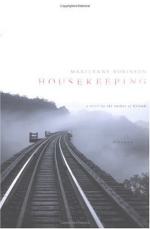|
This section contains 276 words (approx. 1 page at 300 words per page) |

|
Selfhood and shelter have had an intimate association in literature…. [The] notion of shelter is linked with an inner effort to forge a new self. (pp. 306-07)
[In] Housekeeping, Marilynne Robinson has exploited this familiar connection, immersing it in a story as riveting and taut as the plunge of a train from bridge tracks into lakewater below, the book's primal and haunting incident. While its homely title suggests domesticity, such a connotation is askew of the novel's design, which limns personal preservation as much as household maintenance, private as well as familial order. Yet the two themes are fundamentally inseparable, and "house" here is the self, product of toil and prey to destruction. In the end, both literal and figurative houses are intentionally destroyed, but out of ashes and dissolution a new self and life emerge….
The underlying pilgrimage that impels the novel is … an ordinary one, the...
|
This section contains 276 words (approx. 1 page at 300 words per page) |

|


